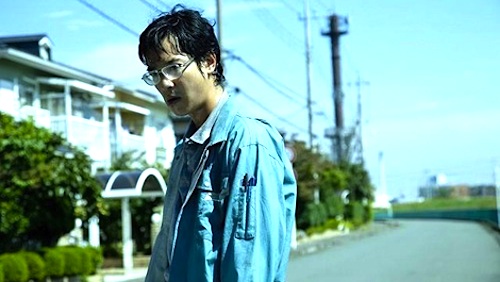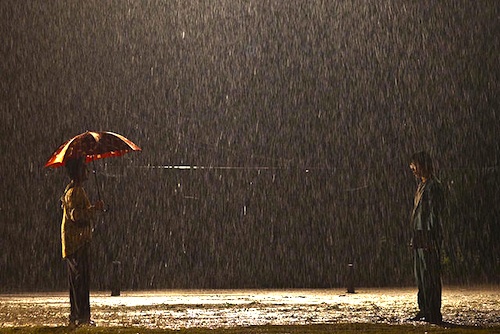
By Joe Bendel. Japan gave the world one of the greatest revenge stories of all time. Sadly, Hollywood is reportedly returning the favor by butchering Keanu’s 47 Ronin into some kind of cheesy Frankenstein’s Monster. It turns out vengeance-taking is a trickier proposition than people realize. A grieving husband understands this only too well in Masaaki Akahori’s The Samurai that Night (trailer here), which screened last night as part of the 2013 Japan Cuts: The New York Festival of Contemporary Japanese Cinema.
Kenichi Nakamura was always socially awkward, but the hit-and-run death of his wife Hisako reduces him to a scant shell of a man. Nearly five years later, Hiroshi Kijima, the violent petty thug responsible for her death, has been released from jail. He is neither reformed nor remorseful, but he is a little unnerved by the daily death threats he receives from Nakamura promising to kill him on the fast approaching anniversary of Hisako’s death. Yet, he still has the presence of mind to use the poison pen letters to extort money from Nakamura’s earnest brother-in-law.
A moodier, slower burner than even the original, misunderstood Death Wish, Samurai hardly gives viewers any consolation whatsoever. Nakamura is a profoundly damaged soul, Kijima is absolutely rotten to the core, and neither is likely to change. Still, agonizingly touching moments spring up in the most surprising places, such as when the rough hewn employees of Nakamura’s metal works express affection for their disintegrating boss.

Far from a genre crowd-pleaser, Samurai vividly depicts the ugly, awkward, and messy realities of violence. Viewers are not likely to forget the climatic showdown, precisely because of the ways it undercuts expectations and payback genre conventions.
As the sweat-drenched, tighty-whitey wearing Nakamura, Masato Sakai fearlessly put himself out there. At times, he is absolutely painful to watch, like a huge open sore picking itself apart on-screen. In contrast, Takayuki Yamada’s Kijima is a study in fiercely controlled aggression. Mercifully, Kinuwo Yamada and Tsutomu Takahashi add a deeply humane dimension to the film as bystanders sympathetic to Nakamura.
You have to admire the integrity of writer-director Akahori’s vision. His unforgiving depiction of human nature never gives his characters anyplace to hide. It is a world of drab colors and humdrum homes that loses nothing in the translation. This is a writer’s film much more than a director’s film, matter-of-factly presenting the angst and cruelty of his characters. Powerfully brought to life by an accomplished cast, The Samurai that Night is highly recommended for those not intimidated by everyday tragedy, as this year’s Japan Cuts concludes at the Japan Society.
LFM GRADE: B
Posted on July 22nd, 2013 at 3:04pm.